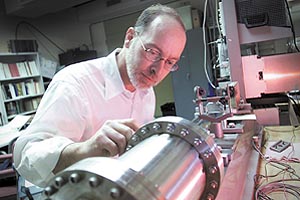Mark Oreglia, Associate Professor in Physics
By Steve KoppesNews Office
 Mark Oreglia |
“I came in later in the evening to do some work, and then I opened it and I was absolutely dumbfounded,” Oreglia said. The letter notified Oreglia that he was the recipient of a 2001 Quantrell Award for Excellence in Undergraduate Teaching. “I honestly don’t see how I got it. Sometimes you shouldn’t ask too many questions.”
But Oreglia does ask a lot of questions about the inner workings of nature, ambitious questions that he is trying to answer with the help of three students from the College.
“I’ve got the best team ever right now,” said Oreglia, of College students Karen Kasza, David Billmire and Eric Switzer. All three joined his research team after taking his Intermediate Mechanics I class last Fall Quarter.
“Students like that are what make life at the University so wonderful,” he said. “There are so few places where you’ve got so many students of this caliber.”
Oreglia and his team of undergraduates are developing potential components for a subatomic particle accelerator that is being planned as a successor to the Large Hadron Collider now under construction at CERN, the European particle physics laboratory. Physicists expect the LHC to dominate particle physics research for years following its completion in 2006.
“We’re looking at how to construct a muon collider. The technical challenges are enough to scare the pros,” Oreglia said. “It’s very speculative. We don’t know if it will be cost-effective at this point or even doable, but that’s half the fun. We have to find out.”
Oreglia has taught a gamut of classes ranging from the Physics for Poets sequence to first- and second-year courses for physics concentrators. He especially enjoys teaching second-year physics majors.
“They’re just seeing the beauty of physics for the first time, having breathed a sigh of relief getting through their first year.”
Second-year physics classes are the first ones that reach the professional level, Oreglia said. Students use the same mathematics that physicists use, so he can begin describing the science in a completely different language than he uses in classes for first-year or non-physics concentrators.
“The thing that elates me about teaching those courses is I really talk to the students as colleagues rather than as students,” he said.
Regardless of the class level, Oreglia said he tries to dig beyond the textbook when preparing his lectures.
“I look at the textbook and get bored to death. Then I say, what is it about this topic that really gives it life? And it’ll either be something about the mathematics or something about the application of some dry principle of physics. You just try to bring it to life in a manner that some textbooks can but often don’t.”
Sometimes the best way to do that, Oreglia has found, is to abandon his planned lecture and bring the latest findings from a conference or his own research into the classroom.
He did that last year in his Physics for Poets class when he was in the thick of the search for the Higgs boson, the subatomic particle responsible for endowing mass to objects in the universe, a project at CERN.
“These are always the best lectures, by far.”
The secret, Oreglia said, is to follow the example set by the late Gregor Wentzel, longtime Professor in Physics. Wentzel is the namesake of the Wentzel Prize, given annually to the department’s best teaching assistants. He was legendary for his teaching abilities and for never using lecture notes.
“My biggest criticism of myself is I bring notes to class and all too often rely on them as a crutch,” Oreglia said. “When I can put them aside, the lectures are always better.”
![[Chronicle]](/images/small-header.gif)